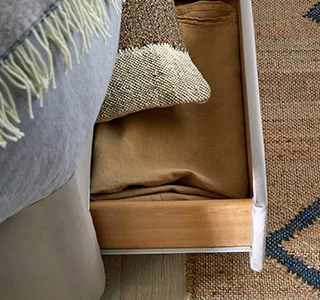10 ways to a more sustainable lifestyle

There’s many things we all do in our day-to-day life which impact the planet in a negative way - from the choices we make at the supermarket to the rubbish we throw out and how often we travel. All these things soon add up, causing damage to the environment, however more of us are coming round to the idea that we need to live a more sustainable lifestyle in order to protect the earth for future generations.
what is sustainable living & why is it important?
Simply put, sustainable living is all about making choices that have as little impact as possible on the environment and also aiming to replace the resources that we do use. Right now, the rate of energy consumption, resource production and wastage is unsustainable, which in turn is leading to major environmental issues, including climate change and pollution.
Making small changes such as eating less meat and saving energy around your home are just a couple of steps that you can make towards living more sustainably, helping to tackle climate change and pollution - read on to discover more ways that you can be kinder to the planet.
10 ways to live more sustainably
1. eco-friendly purchases
More retail companies than ever before are presenting consumers with eco-friendly products, such as mattresses containing recycled plastic and jeans made from repurposed denim. So, when we do make a purchase, we can be assured we’re doing our bit to help protect the environment.
The fashion industry is the biggest polluting industry in the world. When shopping for new clothes, consider buying from charity shops and sustainable clothing brands, to help lessen the environmental impact. Avoid fast-fashion, and instead choose better quality clothes that last longer.
When it comes to shopping for food and drink such as chocolate and coffee, look out for Fairtrade certified products, which are made by companies committed to sustainable production.
It’s not only food and drink where you can make more eco-friendly choices, green cleaning products should be high up on your list too. Some cleaning products contain chemicals that cause harm to the environment, so next time you’re in the supermarket, look for eco-friendly household cleaners, or even better, make your own from items such as vinegar and baking soda.
2. recycle as much as possible
Recycling and reusing as much as possible helps reduce the amount of waste going to landfill, and it’s easier than ever before to ensure you’re doing your bit. For example, major supermarkets now have plastic recycling collection points for plastics such as bread bags, carrier bags and frozen food bags, as these can’t usually be recycled from home. Make sure to continue separating household waste into your recycling bins too - every bit of recycling we do all makes a difference.
Another good idea is to try to reuse items as many times as possible, such as glass jars, cans and containers before throwing them out. Get inventive too - old towels, bedding and clothes can be cut up and used as rags or dust cloths, meaning even less goes to landfill.
3. save energy
Saving energy around your home helps to cut carbon emissions and reduces gas and electric bills. Draught-proofing windows, doors and letterboxes is one of the cheapest yet most effective ways that you can save energy and money - you can do this yourself with specially made products or get it done professionally.
Other ways to save energy around your home include switching off appliances so they aren’t on stand-by, turning the heating down and making sure your home is sufficiently insulated. Saving energy at home isn’t just something that has to be done during the daytime, you can also make sure you’re doing your bit to help save the planet as you sleep by turning the central heating off and unplugging devices.
4. switch to green power
Choosing to power your home using green or renewable energy helps to reduce the amount of carbon emissions you produce. If you’re looking for a new energy supplier, choose one that’s backed by renewable sources. You could also consider getting solar panels fitted and switching to an air source heat pump to make your home more sustainable. After all, renewable energy really is the energy of the future.
5. reduce water usage
Did you know the average person uses 140 litres of water per day? Water is one of our most precious resources and reducing your usage will go a long way to making a big difference to the environment.
There’s many ways you can save water around your home such as taking shorter showers, only filling the kettle with the amount of water you need, turning the tap off when brushing your teeth, fitting a water-saving shower head and flow restrictors to taps. Add a water butt to your garden too, to prevent using water from the tap when washing the car or watering your garden.
6. let the garden grow
Letting the grass grow longer between cuts reduces petrol or electric usage, which in turn helps to lower carbon dioxide emissions. Longer grass encourages wildlife, such as hedgehogs, into your garden and is more drought resistant too. And, if you love fresh flowers, consider growing your own, instead of buying them from the supermarket, which are imported from various countries such as the Netherlands and even from as far afield as Kenya and Ecuador.
7. grow your own fresh produce
Whether in your garden or on an allotment, growing your own fruit and veg means you’re not contributing to the use of pesticides, which lead to air and water pollution. Home grown fruit and veg also helps to lower the amount of fossil fuels that are used when transporting fresh produce to supermarkets.
8. eat less meat
Meat production is one of the biggest contributors to climate change, accounting for almost 60% of all greenhouse gases from food production and leading to pollution in waterways and landscapes. By choosing to eat less meat, we can all help reduce the impact this industry has on the planet.
9. drive less
In the UK, the average petrol car produces the equivalent of 180g of CO2 for every kilometre driven, while for a diesel car it’s 173g of CO2. To keep emissions to a minimum, and if your destination is close enough, walk or cycle instead of getting in the car - better for the environment and your health. You could also make more use of public transport, which is another good way to cut down on greenhouse gas emissions.
10. go plastic-free
Every day around a staggering 8 million pieces of plastic make their way into our oceans. It may be challenging, but aiming to live as plastic-free as possible is an important step that we can all take to help protect our environment. From polluting the oceans to causing damage to wildlife and ending up on landfill sites for many decades without decomposing, plastic has a devastating effect on the planet.
Some ways that you can reduce your plastic usage include using reusable shopping bags, choosing a reusable drinks bottle or coffee cup, cutting out frozen meals, choosing bar soap and selecting toiletries that are in plastic-free containers.
At Silentnight, we’re committed to reducing emissions and tackling plastic pollution. We have made incredible progress on our sustainability goals in the last decade, reducing carbon emissions by 49% in the last four years alone. What’s more, we recycle over 35,000 mattresses each year and are dedicated to ensuring our oceans are healthy, pollution free and protected.

























